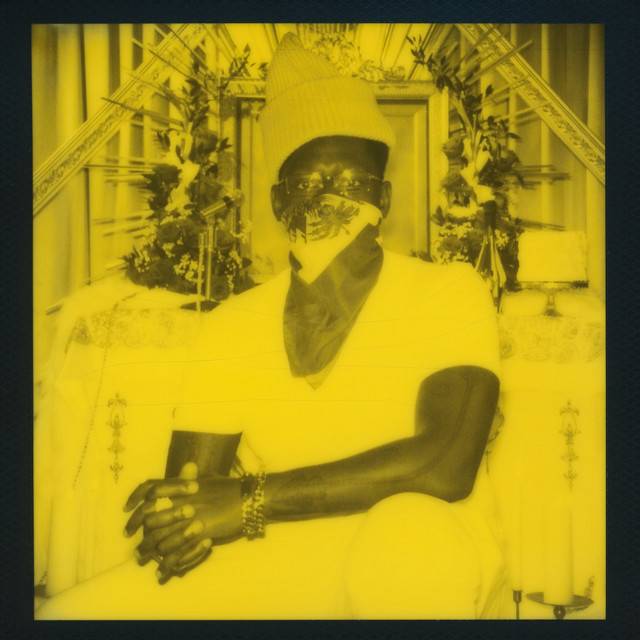
Mach-Hommy 'Balens Cho' Continues To Demystify The Esoteric Rapper
 64
64  65
65 New Jersey rapper Mach-Hommy returns with his new Hip Hop album Balens Cho. HipHopDX breaks down Mach-Hommy’s Balens Cho.
Mach-Hommy has built a career on being mysterious and elusive. His face has been concealed under a bandana for the duration of his time as Hip Hop’s lyrical underground darling. Before adding his music to streaming services, Mach’s music functioned like streetwear drops; limited printed vinyls (Mach’s Hard Lemonade is listed for $444.44) that are probably being resold on the internet for double their price.
But recently, Mach has decided to open his world to a larger audience. At the start of 2021, Mach and Griselda’s Westside Gunn squashed their beef and hit the studio together. With Gunn playing the role of curator, the result was Mach’s most accessible record to date, Pray for Haiti, the spiritual sequel to his debut, HBO (Haitian Body Odor). Backed by Gunn’s ad libs and knack for incendiary shit-talking, Mach would deliver his most bone crushing raps yet. Mach used Pray for Haiti to accomplish two things: bring awareness to Haiti’s diaspora and its political crisis and to cement his ironclad legacy in the underground.
Pray for Haiti soared streaming charts on the night of its release, putting Mach in the limelight and his visibility reaching an all-time high. Mach’s new album, Balens Cho (Hot Candles) finds him on top of the mountain, but still enigmatic and obscure.
Pray for Haiti’s production consisted of Griselda affiliates and NYC 90’s revivalists Camouflage Monk, Conductor Williams, Denny Laflare, Cee Gee, DJ Green Lantern and Messiah Musik. But on Balens Cho, the production is mainly handled by Craven, Williams, and Mach himself. The venomous bars found on the previous record have been exchanged for wisdom and enlightenment. Mach’s vivid storytelling is exuberant with succulent details that materialize characters in his world that feel effortless.
On the album, the masked rapper reflects on cause and effect, lessons from his youth that became pillars for adulthood. Using his new vantage point provided by his widening audience, Mach has taken on a role like KRS-One, to educate the younger generation on the ails of street life and the consequences behind it.
The celebration of self-growth is prominent in the blaring, triumphant horns in the opening seconds of “LABOU.” The tropical percussion provides a warming effect, emulating vibes fit for an island beach resort. He raps with the pep of someone that won a championship game. “I got it out the mud, swear to god,” he sings with the pride and glory of the last gladiator standing. However, Mach’s joy shouldn’t be misconstrued as self-indulgence, as it’s a demonstration of perseverance using himself as the example. Balens Cho sports a more optimistic tone compared to Pray for Haiti’s thick grit and grime, but the rhymes never lose potency.
He also begins to show people who he is under the bandana. On “Wooden Nickels” the curtain lifts to offer a glimpse into Mach’s psyche. His writing is concise yet detailed enough to tell his grandfather’s story of Haitian immigration and the lessons he’s learned from it. Over Fortes’ somber piano melody, Mach talks about his grandfather being disregarded by those he helped following his death. He credits this for putting himself above anyone else.
“MONEY MAGNETS” links Mach with his partner in crime, The God Fahim, to trade bars like a 90’s cypher held in some dude’s basement. Mach and Fahim operate like Ghostface Killah and Raekwon; Mach with Raekwon’s mafioso smarts, and Fahim with Ghost’s code of honor and nasally delivery. If Mach is the initial push, Fahim operates as the force behind it. The bass sounds like bare knuckles crashing into drywall, and it’s led by a fractured piano arrangement and snapping snares courtesy of Nicholas Craven.
The slight hiccup is the album’s closer, “SELF LUH,” a record about taking care of yourself and being more conscious of the things you do to your body. He criticizes people for chasing the bag and eating gas station hot dogs in the back of Bentleys. While the sentiment is commendable, it comes across as preachy and corny. This record also doesn’t match the accessibility of Pray For Haiti and is more in line with his previous more esoteric work. This isn’t the record to use to introduce the indoctrinated to Mach.
The raps aren’t as grizzly and menacing as Pray for Haiti, but his penmanship strengthened over seven months. The wordplay is filled with wit and wisdom and his gifted storytelling can carry over to screenplays. The album is also well-paced and sequenced. As he detailed on, “La Cinqume,” Mach is on top of the mountain as one of underground rap’s most respected and revered artists in the last decade. But to the mainstream masses, Mach-Hommy is still mysterious, unknown and a gemstone hiding in plain sight.
REPEAT ME
FAN FEEDBACK
Man. Pains me to report that everyone on your timeline is 100% correct. This Mach Hommy is incredible. He’s fully assumed Doom’s mantle. Best calendar year for any rapper since Future 2015. Two classics. Crazy shit.
— ? (@TheFakeAbeBeame) December 4, 2021
Mach-Hommy leaving the studio after recording Separation of the Sheep and Ghosts. pic.twitter.com/15Hd64rQRp
— Ruben || Check the Rhyme (@checktherhyme1_) December 4, 2021
Mach-Hommy transcended all emcee pic.twitter.com/zkPsgYGlT3
— Trev (@TrappinTrev) December 5, 2021


